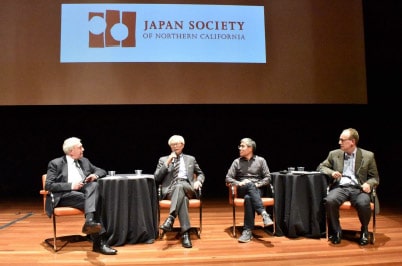Ashes to Gold: How the 1964 Olympics Transformed Japan and Lessons for 2020
 News icon Dan Rather headlined an all-star panel on December 8 at the de Young Museum of Fine Arts in San Francisco to talk about the remarkable story of the 1964 Tokyo Olympics and lessons from Japan in the run-up to the 2020 Olympic Games. The Japan Society of Northern California was thrilled to host the program, which also featured Tomohiko Taniguchi, one of Japan’s most prominent commentators and a close adviser to Prime Minister Abe, James Higa, a long-time collaborator with Steve Jobs and well-known Silicon Valley philanthropist, and UC Berkeley Professor Steven Vogel, one America’s leading Japan experts.
News icon Dan Rather headlined an all-star panel on December 8 at the de Young Museum of Fine Arts in San Francisco to talk about the remarkable story of the 1964 Tokyo Olympics and lessons from Japan in the run-up to the 2020 Olympic Games. The Japan Society of Northern California was thrilled to host the program, which also featured Tomohiko Taniguchi, one of Japan’s most prominent commentators and a close adviser to Prime Minister Abe, James Higa, a long-time collaborator with Steve Jobs and well-known Silicon Valley philanthropist, and UC Berkeley Professor Steven Vogel, one America’s leading Japan experts.
Mr. Rather began the proceedings by explaining why he is planning a documentary on the 1964 Olympics, which he called one of the “most remarkable, and underreported, stories of my life as a journalist.” The first non-Caucasian nation to host the Games, Japan was still rebuilding, both physically and psychologically, after its utter defeat less than two decades earlier. The Games marked a transformation of Japan in the eyes of its own people and the rest of the world from a defeated aggressor to peace-loving, prosperous and technologically advanced nation. The documentary, which is currently fund-raising, would look at the behind-the-scenes story of how Japan successfully executed the 1964 Olympics and transformed Japan in the process. (see full text of Mr. Rather’s remarks here: goo.gl/5I1tzy)Professor Taniguchi delivered a keynote address that looked back at the 1964 Olympics focusing on both the pride felt by the Japanese people in the rapid progress the nation had made after the war as well as the ambivalence of a population still scarred by war and shame. He contrasted the impression made by International Olympic Committee Chairman Avery Brundage who delivered his welcoming address at the Games in polished Japanese with the iconic Occupation era photo of General MacArthur, casually dressed in open collar uniform, with the Emperor, standing stiffly next to him in tails. He ended by noting that the award of the 2020 Olympics has given hope to young Japanese, many of whom have only known a Japan in economic and political decline. (see the slides here: goo.gl/qN433D)
 A panel discussion moderated by Mr. Rather focused on how Japan would use the 2020 Games to engineer a similarly significant retransformation of Japan as it addresses serious demographic and security challenges. James Higa talked insightfully about the role that technology could play in the transformation of Japan. While 1964 had been about rebuilding Japan from within, 2020 would be about connecting Japan to the outside, he stressed. The 2020 Games would be an excellent opportunity for Japan to connect to the world by making it easier for foreigners to come to Japan and engage with Japanese. Language was one example, and James predicted major advances in AI and interpretation services in the coming years, that could be showcased at the Games. This transformation would require a mind-set change in Japan, which has been famously inward looking and slow in adopting IT.
A panel discussion moderated by Mr. Rather focused on how Japan would use the 2020 Games to engineer a similarly significant retransformation of Japan as it addresses serious demographic and security challenges. James Higa talked insightfully about the role that technology could play in the transformation of Japan. While 1964 had been about rebuilding Japan from within, 2020 would be about connecting Japan to the outside, he stressed. The 2020 Games would be an excellent opportunity for Japan to connect to the world by making it easier for foreigners to come to Japan and engage with Japanese. Language was one example, and James predicted major advances in AI and interpretation services in the coming years, that could be showcased at the Games. This transformation would require a mind-set change in Japan, which has been famously inward looking and slow in adopting IT.
Steve Vogel talked about the demographic challenges that Japan faces with a shrinking and aging population. Increasing productivity would be difficult but Japan was taking steps to address that challenge, as was seen in its efforts to bring more women to the workforce, particularly at management levels, explore ways to more effectively use older workers, and change work practices to boost productivity of its highly educated labor pool.
All the participants noted the importance of the Japan’s strong relationship with the US as it moves to meets these challenges, particularly as a source of technology, a market for its goods and services, and as a security partner. In turn, America will be one of the biggest winners of a successful Japan, as an economic and security partner and as a laboratory for policies and practices to meet demographic challenges that we will all one day inevitably face ourselves



